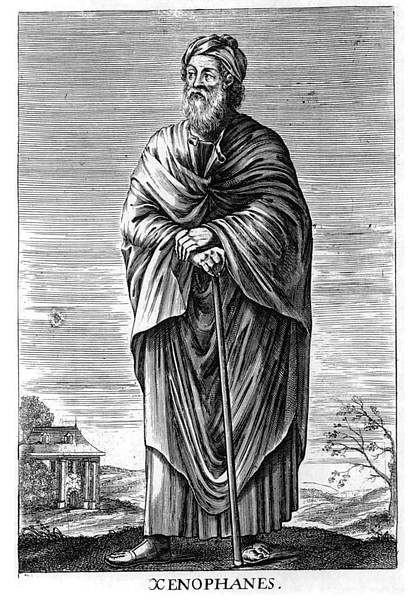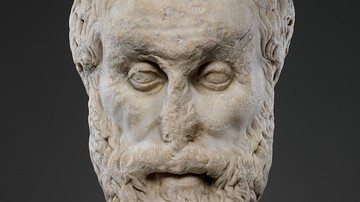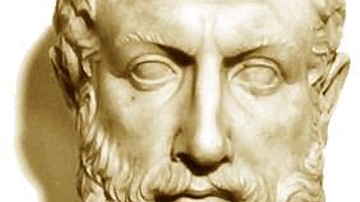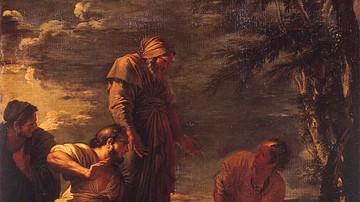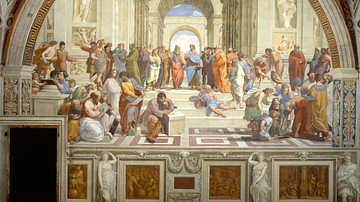Xenophanes of Colophon (l.c. 570-c.478 BCE) is known as one of the Pre-Socratic philosophers of ancient Greece, so-called because they pre-date Socrates (l. c. 470/469-399 BCE), recognized as the Father of Western Philosophy. The Pre-Socratics initiated philosophical inquiry in ancient Greece starting in the 6th century BCE with Thales of Miletus (l. c. 585 BCE) who is understood as the first to ask "What is the basic 'stuff' of the universe?" (Baird, 8). In asking this question, Thales was departing from the cultural understanding that the gods had created the world and sustained it. Thales seems to have believed that there was another, natural, answer to the creation of the world and how it continued to function.
Thales claimed the First Cause of existence was water because it could assume different forms of matter (heated, it became vapor, frozen, it became ice). His inquiries inspired his student Anaximander (l.c. 610-546 BCE) to pursue the same course. Anaximander believed that the First Cause was the apeiron, a cosmic creative force which continuously brought opposites together in making new forms. His efforts inspired Anaximenes, possibly his student, to suggest that air was the First Cause in that it sustained life and, like water, also was able to take different forms.
By this progression, the Pre-Socratics moved from an investigation of the force (or matter) which began existence to the wider and deeper exploration of how best to live one's life exemplified in the works of Plato (l. 428/427-348/347 BCE) and his student Aristotle of Stagira (l. 384-322 BCE) who established the foundation of Western philosophy.
The contributions of all the Pre-Socratics would eventually find a place in the visions of Plato and Aristotle but, apart from the final form of ancient Greek philosophy, are worthy of study on their own. One of the most innovative and imaginary of these thinkers is the visionary Xenophanes of Colophon who was the first among them to suggest that cultural understanding of the gods of Greece was wrong and there was only one God, unlike anything humans could conceive of, who had created the world and allowed it to continue to function as it did.
Early Life and Poetry
Xenophanes traveled and wrote extensively but all that survives of his work are the fragments preserved in the writings of later philosophers and historians. Known chiefly as the first of the Pre-Socratic philosophers to posit the existence of one God, unlike humans in any regard, Xenophanes also had the poet's gift in his ability to capture the enormity of an experience or concept in simple images and few words.
Most of the following fragments have to do with the subject of the gods as imagined by the contemporaries of Xenophanes and, in them, one recognizes a writer and philosopher of infinite common sense and clarity. Rejecting the popular ideas of the day that the immortal gods were as capable of rape and robbery as any of the basest humans, Xenophanes hoped to elevate the vision of his neighbors by introducing a God who was above all human things and, especially, superior to the worst impulses in human nature.
Leaving his native city of Colophon when he was 25, Xenophanes continued to travel and write past the age of 92. It is thought that he must have produced an impressive body of work in that time, not only because of his long life, but because he specifically states that his writing will endure down through future generations "and never die while the Greek kind of songs survives". Most of this work, as noted, as been lost but those pieces which remain extant are among the finest pieces of ancient Greek poetry. An example of this can be seen clearly in Fragment 22:
In winter, on your soft couch by the fire, full of food, drinking sweet wine and cracking nuts, say this to the chance traveler at your door: `What is your name, my good friend? Where do you live? How many years can you number? How old were you when the Persians came?
Fragment 22 is thought to refer to the Median invasion of Ionia in 546/5 BCE which displaced many and destroyed countless lives. It has also been interpreted to reference to Persian Invasion of Greece in 480 BCE by Xerxes I (r. 486-465 BCE) of the Achaemenid Empire (c. 550-330 BCE) who was defeated in 479 BCE but at the cost of an immense loss of life. The earlier Median and later Persian invasions were catastrophic events in the lives of the Greeks who lived through it but, rather than focus on the obvious tragedy or extol the virtues of the fallen, Xenophanes, in a single question, asks his readers to remember the event for themselves. As every generation, in any culture, has their own 'Persian Invasion', this fragment, like many of those of Xenophanes, still resonates today.
Xenophanes' Vision
Xenophanes may have been the original founder of the Eleatic School of Monism, attributed to Parmenides of Elea (l. c. 485 BCE), who may have been his student. Parmenides claimed that all of reality was made of the same, essential, essence and that it was One, indivisible, and what people understood as "change" was an illusion owing to sense perception. The essential essence of all living things was uniform, Parmenides claimed, and even though humans understood life as a series of changes, these were only temporal appearances which did not touch on the underlying form of what constituted reality.
This is in keeping with Xenophanes' vision as he claimed that there was one God, greater than any of the anthropomorphic visions of the gods of Greece, who created and maintained all of his creation through the operation of his will. Xenophanes' God differed significantly from the accepted gods of the Greeks in that he seems to have been understood as pure spirit, or reason, an intelligent entity whose brilliance and creative energy far exceeded the ability of the human mind to comprehend it.
Xenophanes' Fragments
As noted, Xenophanes' large body of work did not survive to the modern era and all that remain are fragments which scholars have studied, along with whatever later writers reported of him, to piece together the events of his life and his philosophy. The following fragments, given only in part of the extant works, are from Kathleen Freeman's Ancilla to The Pre-Socratic Philosophers:
It is proper for men who are enjoying themselves first of all to praise God with decent stories and pure words. But when they have poured a libation and prayed for the power to do what is just – for thus to pray is our foremost need – it is no outrage to drink as much as will enable you to reach home without a guide, unless you are very old. But the man whom one must praise is he who, after drinking, expresses thoughts that are noble, as well as his memory and his endeavor, concerning virtue, not treating of the battles of the Titans or of the Giants, figments of our predecessors, nor of violent civil war, in which tales there is nothing useful; but always to have respect for the gods, that is good (DK 1).
Since from the beginning all have learnt in accordance with Homer…Both Homer and Hesiod have attributed to the gods all things that are shameful and a reproach among mankind; theft, adultery and mutual deception. They have narrated every possible wicked story of the gods. Mortals believe the gods to be created by birth, and to have their own (mortal's) raiment, voice and body. But if oxen (and horses) and lions had hands or could draw with hands and create works or art like those made by men, horses would draw pictures of gods like horses, and oxen of gods like oxen, and they would make the bodies of their gods in accordance with the form that each species itself possesses. Ethiopians have gods with snub noses and black hair, Thracians have gods with grey eyes and red hair (DK 10-16).
There is one god, among gods and men the greatest, not at all like mortals in body or in mind. He sees as a whole, thinks as a whole, and hears as a whole. But without toil he sets everything in motion, by the thought of his mind. And he always remains in the same place, not moving at al, nor is it fitting for him to change his position at different times. For everything comes from earth and everything goes back to earth at last (DK 23-27).
We all have our origin from earth and water (DK 33).
And as for certain truth, no man has seen it, nor will there ever be a man who knows about the gods and about all the things I mention. For if he succeeds to the full in saying what is completely true, he himself is nevertheless unaware of it; and opinion (seeming) is fixed by fate upon all things. Let these things be stated as conjecture only, similar to the reality (DK 34-35).
Conclusion
Xenophanes' claim that there was only one God, in defiance of the recognized polytheism of his time, may seem surprising, especially if one considers the fact that impiety in anciet Greece was considered a crime worthy of the death penalty. It would seem that Xenophanes avoided conflict with religious authorities by presenting his philosophy in poetic form and phrasing his concept of a single god as "there is one god, among gods and men the greatest" which left open the interpretation that, perhaps, he was referencing Zeus, the king of the Olympian gods.
It is interesting to consider how Xenophanes arrived at his conclusion that the First Cause was a single deity, unlike the understanding of the gods he would have grown up with, or why he departed from the usual path of the earlier Pre-Socratic philosophers who maintained that the First Cause was a naturally occurring element or cosmic force. It could be, since it is known he traveled widely, that he was exposed to the religion of Zoroastrianism of ancient Persia, the first monotheistic faith in the world which established itself and was developed, and brought the concept of a single, all-powerful god back to Greece.
His claim regarding the one god, perhaps because of the poetic presentation of the claim, was never developed in ancient Greece. The polytheistic religion of the Greeks would continue until the rise of Christianity which then undercut its basic tenets and replaced it as the culture's belief system. Even so, Xenophanes is considered a visionary for recognizing a paradigm completely foreign to his culture and early experience and the power of his imagination in moving beyond cultural barriers to realize possibilities his contemporaries could not even conceive of.
